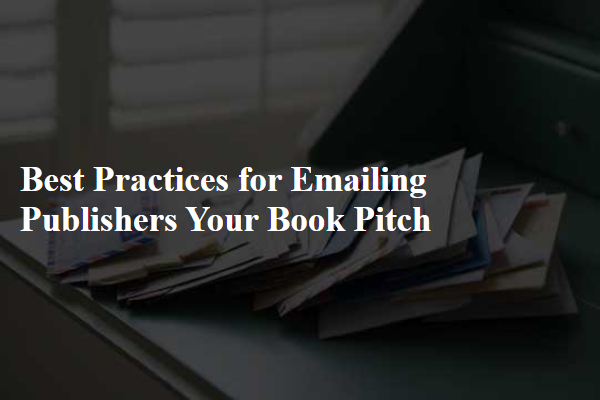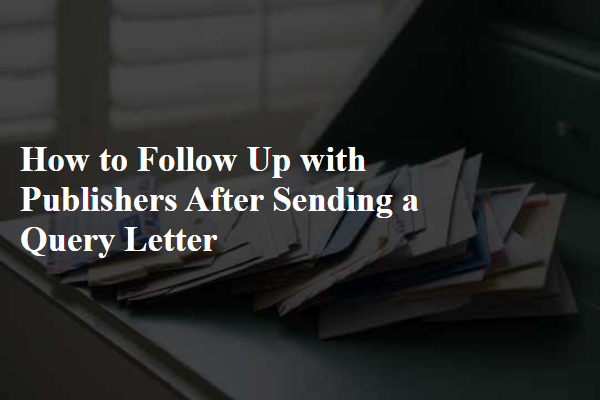
Craft a concise and compelling subject line that captures the essence of your book, ensuring it stands out in a crowded inbox. Personalize your email by researching the publisher's preferences, addressing the right editor, and aligning your pitch with their current catalog. Include a brief, engaging synopsis and relevant credentials, while attaching your manuscript only if explicitly requested to maintain professionalism.
Crafting a Compelling Subject Line
Pitching your book to publishers via email requires a strategic approach to make a strong impression. Clear, concise, and engaging communication increases the chances of your book being noticed.
- Personalize Your Email - Address the publisher by name and reference their specific interests or previous works to show genuine research and connection.
- Craft a Compelling Subject Line - Use a brief, attention-grabbing subject line that highlights your book's genre and unique selling point to increase open rates.
- Include a Concise Book Summary - Provide a clear, engaging synopsis of your book in two to three sentences that emphasize its theme, target audience, and market potential.
Personalizing Your Greeting
| Best Practices for Emailing Publishers Your Book Pitch |
|---|
| Research Target Publishers - Identify publishers specializing in your book's genre to enhance relevance and increase acceptance chances. |
| Use a Clear, Concise Subject Line - Craft a subject line that captures the essence of your pitch and grabs attention immediately. |
| Personalize Each Email - Address the editor or acquisitions manager by name and reference specific information about their publishing house. |
| Introduce Your Book Briefly - Summarize the book's premise in 2-3 sentences, highlighting unique elements and target audience. |
| Include Relevant Credentials - Mention your author background, previous publications, awards, or any expertise related to the book topic. |
| Attach or Link a Synopsis and Sample Chapters - Provide a clear, professional synopsis and 1-3 sample chapters as per publisher guidelines. |
| Keep the Email Professional and Concise - Avoid long paragraphs; use short, clear sentences and correct grammar to maintain professionalism. |
| Follow Submission Guidelines Strictly - Review publisher requirements for formatting, attachments, and pitch content to ensure compliance. |
| Include Contact Information - Provide your full name, email address, phone number, and any relevant social media handles or author websites. |
| Proofread Before Sending - Check for typos, spelling errors, and formatting issues to present a polished pitch email. |
Keeping Your Pitch Concise
Crafting a compelling email pitch for publishers requires clarity and professionalism. A concise subject line and personalized greeting increase open rates.
Begin with a brief introduction of your book, highlighting its unique elements and target audience. Include relevant credentials or previous publications to establish credibility. Conclude with a clear call to action, such as requesting a manuscript review or meeting.
Highlighting Your Book's Unique Value
When emailing publishers your book pitch, craft a concise and compelling subject line to capture immediate interest. Include a brief summary of your book, its target audience, and why it stands out in the current market. Attach a professional query letter and sample chapters, and follow submission guidelines precisely to increase your chances of a positive response.
Demonstrating Market Awareness
How can authors effectively pitch their book to publishers via email? Crafting a concise and compelling email increases the chances of capturing a publisher's attention. Clear subject lines and personalized greetings enhance email readability and professionalism.
What content should be included in a book pitch email to publishers? Summarize the book's premise, target audience, and unique selling points in a brief paragraph. Including relevant author credentials or previous publications adds credibility.
Why is it important to research publishers before sending a pitch email? Tailoring the pitch to suit the publisher's genre and submission guidelines shows respect for their preferences. This targeted approach improves the likelihood of a positive response.
How long should a book pitch email to publishers be? Emails should remain concise, ideally under 300 words, to maintain the publisher's interest. Avoid overwhelming details by focusing on key selling points and clear calls to action.
What role does follow-up play after emailing a book pitch to publishers? Sending a polite follow-up after a reasonable waiting period demonstrates professionalism and continued interest. It can help keep the submission top of mind without appearing pushy.
Including Relevant Author Credentials
Craft a concise and compelling subject line that clearly states your book's genre and unique angle to capture the publisher's attention. Personalize the email by addressing the publisher by name and referencing their past successful publications that align with your book's theme. Include a brief synopsis, target audience, and your author credentials to establish credibility and relevance in your pitch.
Providing a Clear Book Synopsis
Craft a concise and compelling subject line to capture the publisher's attention immediately. Personalize the email by addressing the editor or agent by name and referencing their publishing focus.
Begin with a brief introduction of yourself and your book, highlighting its genre and unique selling points. Include a succinct summary that teases the plot or main theme without giving away too much.
Following Submission Guidelines
Craft a concise and compelling subject line that clearly states your book's genre and unique selling point. Publishers receive numerous submissions, so clarity and brevity increase the chance your email will be opened.
Begin your email with a personalized greeting that mentions the publisher's name or a specific editor. Show that you have researched their publishing focus and explain why your book fits their catalog.
Include a brief synopsis of your book, highlighting the main plot, target audience, and what sets it apart from others in the market. Avoid long paragraphs; instead, use clear and impactful language to generate interest quickly.
Mention your writing credentials, any prior publications, and relevant marketing plans or platform to demonstrate your professionalism. Attach a well-formatted query letter and sample chapters in the preferred file format specified by the publisher.
Offering a Professional Closing
Crafting a compelling email pitch to publishers is essential for authors seeking book deals. Clear, concise communication showcases your professionalism and increases the chance of a positive response.
- Research the Publisher - Understand the publisher's genre preferences and submission guidelines to tailor your pitch effectively.
- Write a Strong Subject Line - Create a succinct and engaging subject that immediately captures the publisher's attention.
- Include a Concise Book Synopsis - Summarize your book's core plot, themes, and target audience in a few compelling sentences.
Following these best practices improves your email pitch's effectiveness and enhances your chances of securing a publishing opportunity.
Proofreading Before Sending
Crafting a compelling book pitch email increases your chances of capturing a publisher's interest. Clear, concise, and targeted communication ensures your proposal stands out in a crowded inbox.
- Research the Publisher Thoroughly - Understand the publisher's genre focus and submission guidelines to tailor your pitch appropriately.
- Write a Strong Subject Line - Create a concise and intriguing subject line that highlights the essence of your book to encourage opening the email.
- Include a Brief, Engaging Synopsis - Summarize your book's plot or main idea clearly and compellingly within the first few sentences to immediately capture attention.



Comments